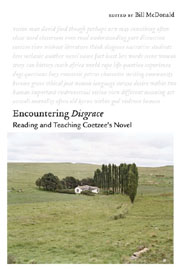Book contents
- Frontmatter
- Contents
- Acknowledgments
- Introduction
- I Reading Disgrace
- 1 “We are not asked to condemn”: Sympathy, Subjectivity, and the Narration of Disgrace
- 2 Beyond Sympathy: A Bakhtinian Reading of Disgrace
- 3 “Is it too late to educate the eye?”: David Lurie, Richard of St. Victor, and “vision as eros” in Disgrace
- 4 Disgrace and the Neighbor: An Interchange with Bill McDonald
- 5 To Live as Dogs or Pigs Live Under Us: Accepting What's on Offer in Disgrace
- 6 Tenuous Arrangements: The Ethics of Rape in Disgrace
- 7 Dis(g)race, or White Man Writing
- 8 Clerk in a Post-Religious Age: Reading Lurie's Remnant Romantic Temperament in Disgrace
- 9 Saying it Right in Disgrace: David Lurie, Faust, and the Romantic Conception of Language
- 10 The Dispossession of David Lurie
- II Reading Disgrace with Others
- Works Cited
- Notes on the Contributors
- Index
10 - The Dispossession of David Lurie
from I - Reading Disgrace
Published online by Cambridge University Press: 12 September 2012
- Frontmatter
- Contents
- Acknowledgments
- Introduction
- I Reading Disgrace
- 1 “We are not asked to condemn”: Sympathy, Subjectivity, and the Narration of Disgrace
- 2 Beyond Sympathy: A Bakhtinian Reading of Disgrace
- 3 “Is it too late to educate the eye?”: David Lurie, Richard of St. Victor, and “vision as eros” in Disgrace
- 4 Disgrace and the Neighbor: An Interchange with Bill McDonald
- 5 To Live as Dogs or Pigs Live Under Us: Accepting What's on Offer in Disgrace
- 6 Tenuous Arrangements: The Ethics of Rape in Disgrace
- 7 Dis(g)race, or White Man Writing
- 8 Clerk in a Post-Religious Age: Reading Lurie's Remnant Romantic Temperament in Disgrace
- 9 Saying it Right in Disgrace: David Lurie, Faust, and the Romantic Conception of Language
- 10 The Dispossession of David Lurie
- II Reading Disgrace with Others
- Works Cited
- Notes on the Contributors
- Index
Summary
Our craft is all in reading the other: gaps, inverses, undersides; the veiled; the dark; the buried, the feminine; alterities.
— J. M. Coetzee, White Writing, 81… those who have indulged in gluttony and violence and drunkenness, and have taken no pains to avoid them, are likely to pass into the bodies of asses and other beasts of that sort. And those who have chosen injustice and tyranny and robbery pass into the body of wolves …
Plato, Phaedo 81E–82AWhat happens to David Lurie in Disgrace? Having been dispossessed of his place and identity in the world of reason, he discovers, or rediscovers, a new way of knowing, as well as a new way of being, that exist, and have always existed, beyond the reach of traditional Western categories of mind and body. Coetzee, through Lurie, privileges the body and the senses as vehicles for knowing and being, and in so doing he reveals a profound connection between his protagonist and the animals whose bodies, passions, and senses traditional philosophy has devalued or ignored, and among whom Lurie, dispossessed, spends more and more of his life. I will argue further that Coetzee's rejection of Western rationalism and his emphasis on embodiment and on the human connection to animal bodies and feelings is anything but celebratory. It is, rather, tragic. Coetzee privileges the body without a glimmer of the hope that marks other contemporary approaches that see the rediscovery of the body as a cause for celebration.
- Type
- Chapter
- Information
- Encountering 'Disgrace'Reading and Teaching Coetzee's Novel, pp. 202 - 230Publisher: Boydell & BrewerPrint publication year: 2009

